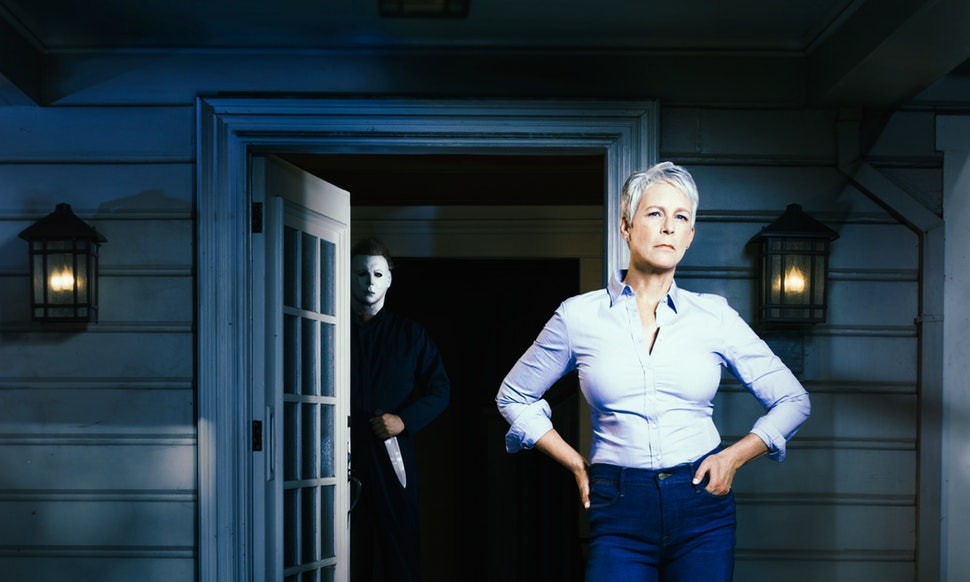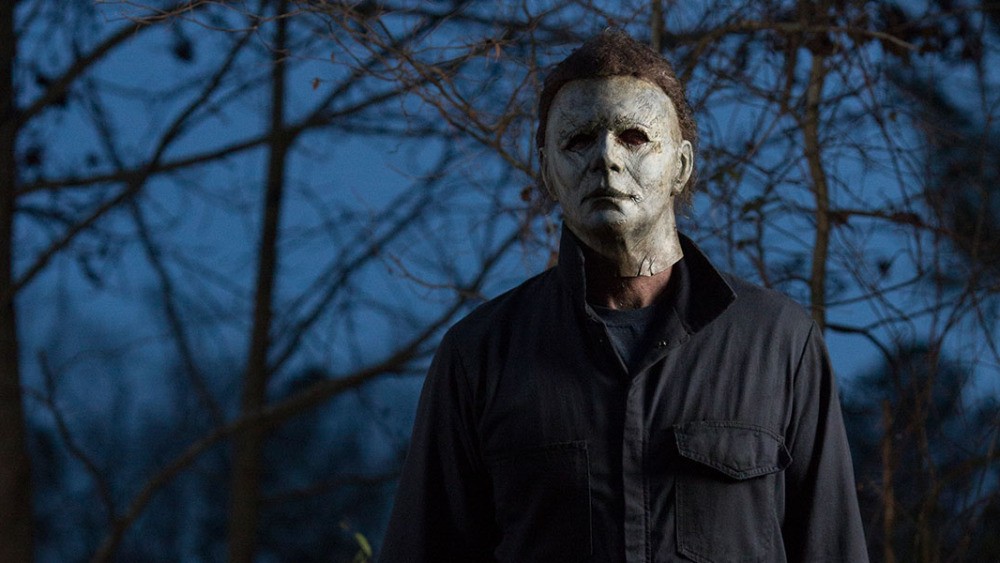
Jamie Lee Curtis returns as the original Final Girl Laurie Strode in David Gordon Green’s new Halloween sequel.
Michael Myers has always been the more streamlined and stately of hallowed movie murderers. His simple mask, his silence, the emptiness of his suburban streets, and the score: they all promise the thrill and nothing else. You will be scared, and there will be no entanglements. Like many franchises, repetition mocks that simplicity, and the films chase the dragon of their initial good. David Gordon Green’s new sequel Halloween gives Myers the treatment he calls for: this is a slasher film that looks away. It is restrained, comparatively.
Myers’ victims are photographed faraway, through glass, through windows, with non-diegetic sound in montage, with blurred lights dotting the night sky around them, through chain-link. The film rearranges the same images in impressionistic combinations to tell the same slasher story we’ve seen so many times. Green, an art film director whose career detoured into large budget comedies, does some of his stronger work here. He tells an archetypal stabby killer story in an almost tasteful manner. Many of the deaths happen out of sight, minority characters are introduced not just to be killed off, and character psychology makes sense.
Laurie Strode (Jamie Lee Curtis) has reacted to Michael Myers killing her friends in the first film (the many sequels are ignored) by becoming obsessed with him. She hoards guns and boobytrapps her house. Her Myers-centric doomsday prepping has estranged her from her daughter Karen (Judy Greer), which in turn drives a rift between Karen and her own daughter Allyson (Andi Matichak). It’s realistic, but a little dour: as their grandmother’s almost-murderer escapes from the local insane asylum, the family sulks and lashes out at each other. But a generational sisterhood reacting to murder is a corrective to a lot of slasher horror, which continually offers up female bodies to be isolated, considered as objects and metaphorically raped. The reaction the films often deny them (because they disappear after their assaults) is the ability to work together to protect themselves and emote a different note than fear.

The original Michael Myers, Nick Castle, reprises his role opposite Curtis. Castle later co-wrote Escape From New York with John Carpenter.
“Have you ever really liked a girl and you just couldn’t have her?” the film’s requisite nerd character asks Michael, thinking he’s a neighbor dressed for Halloween. Later his crush Allyson finds Laurie’s albino target practice dummies and freaks out over their idealized male and female forms in the dark. Awareness of the subtext of slasher films is great, though it does not necessarily make a great movie. Possibly over the next decades discomfort over subtext will mutate slasher films until they’re just about consensual sex with role play. Gorehounds will go somewhere else.
Or rather the confusion between scares, real-world misogynist violence, and sexuality will separate. Pointedly, most of Michael’s victims are older, unobjectified males.
Michael is effective, killing in the background of shots, moving slowly like the mundane nightmare he is. He smashes heads, rips open jaws, and opts for a hammer and fire poker. Characters implore him to “Say something,” but he resolutely does not.
Laurie is frazzled. Curtis is underwritten but good. After a movie full of characters framed through windows, when Laurie finally sees The Shape (as Michael Myers was referred to in the original Halloween script) staring at her from afar in this film, she immediately shoots at him, breaking glass, ruining his gaze. Green does well with scary buildup, specifically in the ending sequence and an encounter on the highway. He peppers the film with his trademark loose-ended conversations, here between a babysitter and her charge, a hunter and his dancing aficionado son, two police officers discussing Vietnamese sandwiches, and cemetery visitors talking about the graves of Bernie Mac and Muddy Waters. But these conversations don’t really tie into the main plot, they just highlight the humanity missing from the murder spree.
Perhaps it would be better if the film followed those conversations, and forgot to ever check back in on the killings. As slasher films repeat, and their checklist of jump scares and gore becomes secondhand to the viewer, excess is own reward. What sticks out in my mind from other Halloween sequels has nothing to do with John Carpenter’s original success. I love the satirical Silver Shamrock song of Halloween III, and the bone deep silliness of Busta Rhymes using martial arts to defeat Michael in Halloween: Resurrection.
That’s why between Jason, Michael Myers and Freddy Kruger, I prefer the Friday the 13th series. Its continual incompetence at telling even the most basic story results in a borderline absurd and surreal mishmash which doesn’t scare, but is always more fun for it.
Halloween (2018)